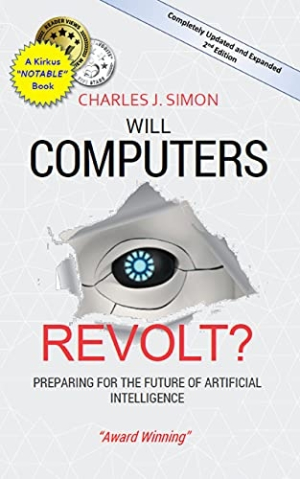Will Computers Revolt?
Preparing for the Future of Artificial Intelligence
Will Computers Revolt? is a fascinating speculative text about the potential and future of AI.
Charles Simon’s Will Computers Revolt? is a knowledgeable primer on the future and limitations of artificial intelligence.
The book begins with a thought experiment that is discombobulating by design, asking the audience to challenge the conflation of the biological brain with the self, and to imagine the replacement of biological neurons with artificial ones. But Simon shows that computers are not like people just because their equivalent of synapses are firing. Indeed, general intelligence—an ability to respond and react to one’s environment, and to learn and grow—requires more than any contemporary AI reflects, he argues.
This is an intriguing, sometimes philosophical, study whose short and complex chapters move with speed. Topics including technological development, evolution, and theories of the brain arise––some without seeming to connect to AI at first, though they are made to do so via curious, thoughtful experiments and theorizing. Though written with authority, the book is made accessible to all via tactile examples, lively comparisons, and clear explanations. In the long middle section, which details how the human brain operates, playful brainteasers even arise mid paragraph to illustrate, in real time, how the brain filters information; and Simon’s intermittent wry humor, and a fanciful short story written from the perspective of a machine, soften some of the book’s long term predictions.
Indeed, much of the book seems designed to assuage people’s fears about AI, both by creating a sense of sympathy with computer operating systems via scientific explanations of human and biological operations, and by showing that science fiction treatments of AI have tended to impose human vices on machines without need, when developers could instead elect to program AI to be “useful to us rather than being like us.”
But though the book asserts that most contemporary AIs, like AlphaGo Zero and Watson, are constrained by the limitations of their programming, it also delights in anticipating a near future when that will not be as true: computers, it shows, are fast approaching the capacities of the human brain. Still, even once AGIs (artificial intelligences with general intelligence) surpass human beings in terms of their capabilities, Simon says, there’s a developmental cushion wherein safety can be presumed. Less reassuring is the book’s speculation that after safety measures evolve out of AGI, humans will be, at most, “interesting” to AGIs, and humanity’s “best hope is that they are interested in us for our uniqueness but that they focus on their own future.”
This second edition is enhanced by links to videos that show its AI concepts in work, making it ideal for digital and interactive reading, as well as by references to Simon’s own programming work and theories, particularly to the complex and intriguing Brain Simulator, an “open-source software project aimed at implementing [an] end-to-end AGI model.” Helpful sidebars in its most technological sections make the book laity-friendly, as do the useful diagrams and illustrations, though the latter are sometimes crude in appearance.
Even if the point of technological singularity is closer than suspected, Simon tells his audience, “there is no reason to assume that intelligent machines will be cataclysmic for the human race.” Such assurances help to make Will Computers Revolt? a fascinating speculative science text about the potential and future of AI.
Reviewed by
Michelle Anne Schingler
Disclosure: This article is not an endorsement, but a review. The publisher of this book provided free copies of the book and paid a small fee to have their book reviewed by a professional reviewer. Foreword Reviews and Clarion Reviews make no guarantee that the publisher will receive a positive review. Foreword Magazine, Inc. is disclosing this in accordance with the Federal Trade Commission’s 16 CFR, Part 255.

